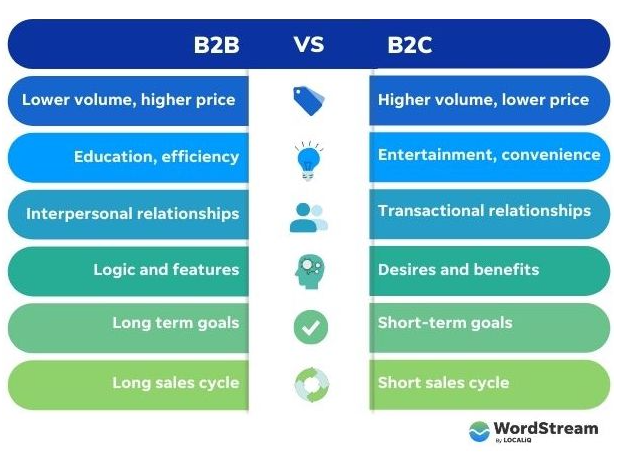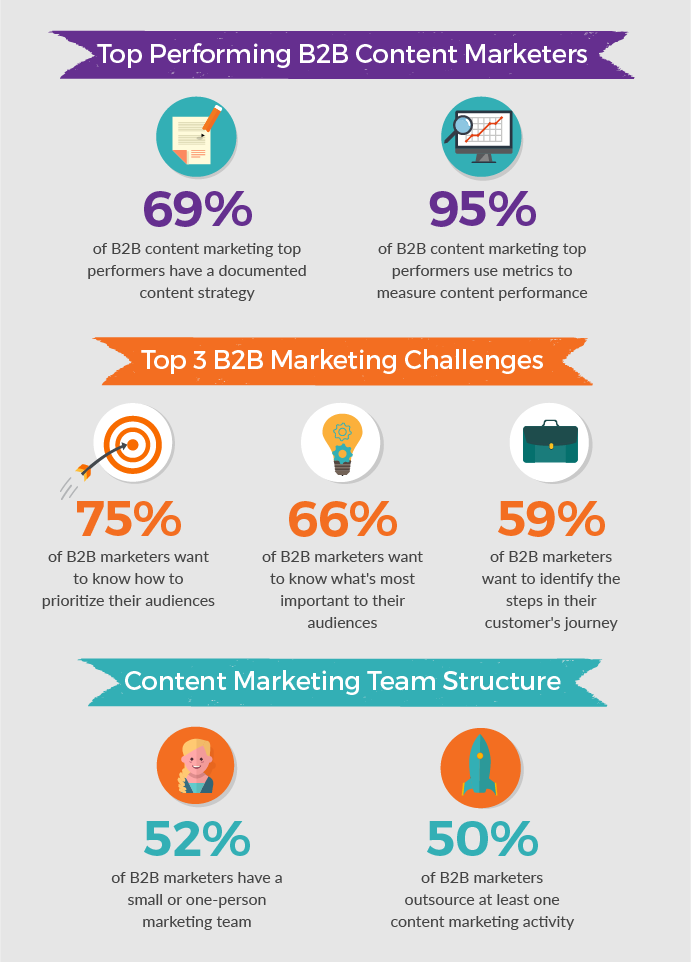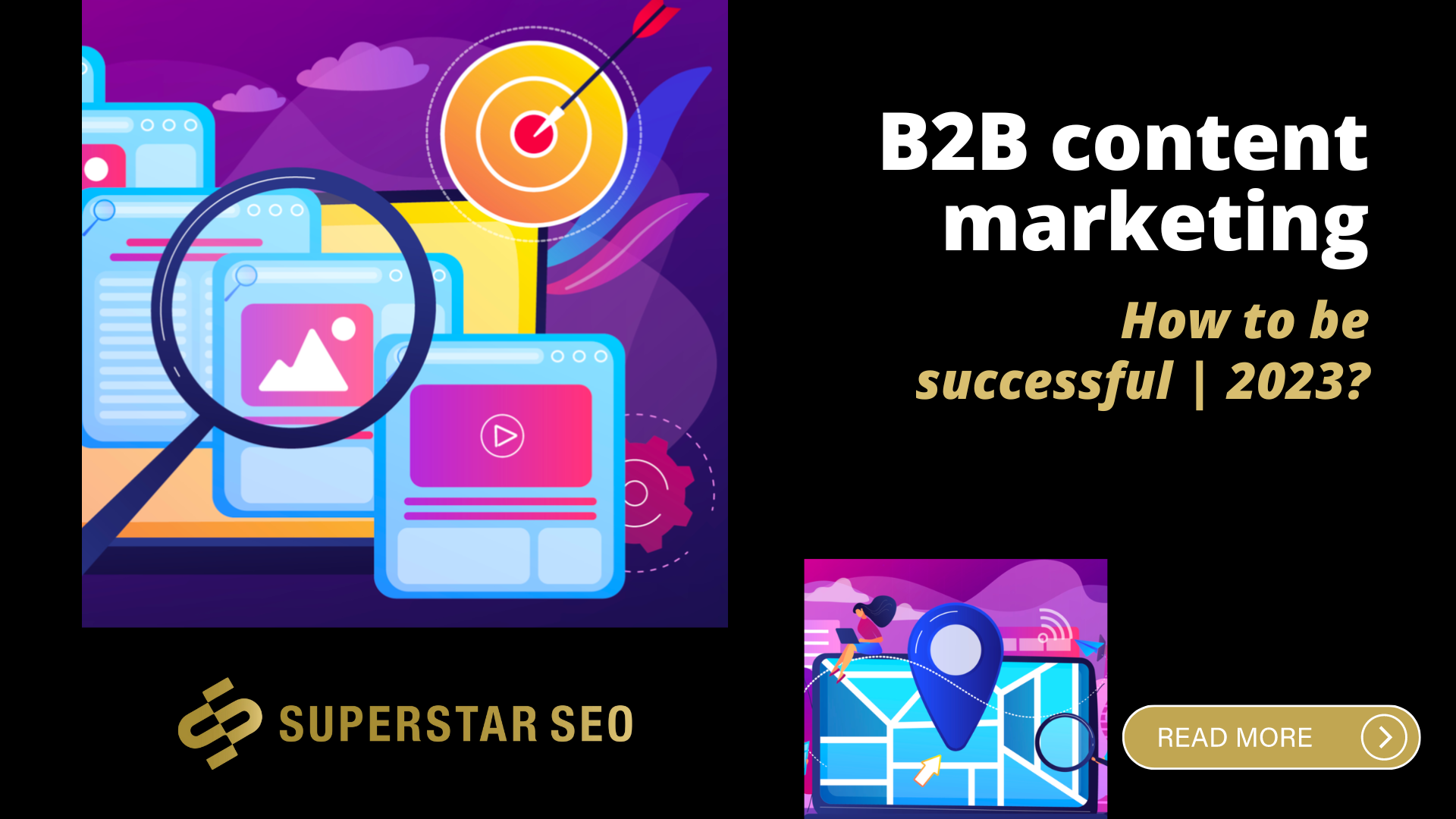B2B Content Marketing: How To Be Successful | 2023?
B2B content marketing and B2C marketing both involve creating and distributing content to a targeted audience.
However, there are some key differences between the two.
A B2B content strategy focuses more on establishing relationships with potential customers, while B2C marketing focuses on direct sales.
Additionally, B2B content marketing is often created to educate and inform potential clients, while B2C content is usually aimed at stimulating demand.

This means that the type of content used in each type of marketing will vary—for instance, blog posts or eBooks for B2B, versus short videos or infographics for B2C.
In this blog post, we will be showing some tips to consider when crafting your B2B content marketing strategy in 2024 and beyond.
What is B2B Content Marketing?
B2B content marketing is a strategic approach used by business-to-business (B2B) companies to create and distribute valuable, relevant, and consistent content to attract and engage a clearly defined target audience. Unlike B2C (business-to-consumer) marketing, which targets individual consumers, B2B content marketing focuses on engaging with other businesses.
The goal is to build relationships, establish thought leadership and ultimately drive profitable customer actions. Effective B2B content marketing involves creating various content formats, including blog posts, whitepapers, case studies, and social media posts, that address the needs and pain points of potential customers.
Why is Content Marketing Important to B2B?
Content marketing is crucial for B2B companies for several reasons:
- Building Trust and Credibility: By consistently providing high-quality content that addresses the challenges and questions of their target audience, B2B companies can establish themselves as thought leaders and trusted advisors in their industry.
- Nurturing Leads: B2B sales cycles are typically longer and more complex than B2C. Content marketing helps nurture leads through the buyer’s journey by providing valuable information at each stage, from awareness to consideration to decision-making.
- Improving SEO and Organic Traffic: Well-crafted content optimized for relevant keywords can improve a company’s visibility on search engines, driving organic search traffic to their website. This, in turn, can lead to more qualified leads.
- Supporting the Sales Team: Content marketing provides the sales team with valuable resources, such as case studies, whitepapers, and blog posts, that they can use to educate potential customers and close deals.
- Enhancing Customer Retention: Engaging content not only attracts new customers but also helps retain existing ones by continually providing them with valuable insights and updates.
B2B Content Writing Strategies
Create Content for Different Stages of the Buyers’ Funnel
When it comes to creating content for all stages of the marketing funnel, it is important to think strategically and consider how each piece of content will add value to the customer’s journey.
Start by segmenting your target audience and then developing content tailored to different buyer’s persona and their needs at different points in the buyer’s journey.
This could include blog posts, infographics, videos, webinars, or even podcasts.
Content should be engaging and relevant to move prospects down the marketing funnel.
Keep in mind that customers may need multiple touchpoints with your brand before making a purchase decision, so having content for different stages of the funnel can help build trust and increase conversions.
Focus on creating content that resonates with your target audience, provides helpful information, and ultimately leads them closer to making a buying decision.
Create a Consistent Content Experience
Creating consistent content experiences is an important part of any marketing strategy.
It allows companies to create an environment where customers can find what they need quickly and easily.
You should create a consistent look and feel across all your content platforms, from webpages to social media, so that customers can recognize the company’s brand at a glance.
Additionally, creating a unified user experience by linking related content together will help customers navigate your website more easily and make it easier for them to find what they’re looking for.
Repurpose Your Content for Different Platforms
Repurposing content for different platforms is a great way to maximize the reach of your B2B content marketing.
By taking an original piece of content and adapting it for different types of media, you can get more value out of the same material.
Doing this helps spread awareness about your brand and its message to a wider audience than just one platform.
Additionally, repurposing your content allows you to reach audiences that may prefer different types of media and encourages interactivity with potential customers.
While it does require additional effort to re-create the same material in multiple formats, it’s worth the effort as long as the content remains relevant and engaging.

Use Storytelling
Using brand storytelling for your B2B clients is a great way to engage them and make them feel connected to your brand.
It can help to create an emotional connection between the business and its customers, driving loyalty and sales.
The key to successful marketing storytelling is to focus on the customer journey rather than simply on the product or service being offered.
In B2B content marketing, when telling a story, it should be tailored to the business audience, considering their interests, needs, and values.
Additionally, it should focus on the core benefits of the product or service in a way that resonates with the customer—highlighting how it will make their life easier or better in some way.
By understanding your customer’s needs and crafting stories that appeal directly to them, you can help build trust between you and your B2B clients.
Think About SEO Optimization
SEO optimization for B2B content is essential to ensure that search engines and potential customers can easily find your content.
It’s important to create content that is optimized with keywords so that it will appear higher in search engine results.
Additionally, you should include links to other related pages (internal linking) and other websites throughout your content, as this will help improve your ranking.
By taking all of these steps into account when creating your B2B content marketing strategies, you can ensure that you get the most out of your efforts.
Types of B2B Content
B2B (Business-to-Business) content can take various forms, each tailored to specific stages of the buyer’s journey and designed to engage, inform, and convert potential business customers. Here are some common types of B2B content:
Blog Posts
Regularly updated articles that provide valuable insights, industry news, tips, and thought leadership to attract and engage a target audience. Blog posts are a cornerstone of a successful content marketing strategy, offering a platform to showcase expertise, answer common questions, and address pain points. High-quality blog content can improve organic search visibility, drive traffic, and nurture leads over time.
Whitepapers
In-depth reports or guides on specific topics that provide detailed information and research are often used to generate leads by offering them in exchange for contact information. Whitepapers are highly valuable for presenting complex data, in-depth analysis, and authoritative insights, making them ideal for decision-makers looking for comprehensive information to guide their purchasing decisions.
Case Studies
Detailed analyses of how a product or service helped a specific client solve a problem, demonstrating real-world applications and successes. Case studies build credibility by showing potential clients tangible results and real-world examples of your solutions in action. They often include metrics and testimonials, providing proof of effectiveness.
Ebooks
Comprehensive digital books on relevant topics are often used to provide valuable information in exchange for lead contact details. Ebooks allow for a deep dive into subjects of interest, offering extensive content that can educate and inform the audience. They are typically longer than whitepapers and can be a powerful tool for lead generation and thought leadership.
Webinars
Live or recorded online seminars offering educational content, training, or expert insights are often used to engage and nurture leads. Webinars provide an interactive platform for engaging with the audience, allowing for real-time questions and discussions. They are excellent for demonstrating expertise, conducting training sessions, and offering in-depth knowledge on industry topics.
Infographics
Visual representations of data or information that make complex topics easier to understand and shareable on social media platforms. Infographics combine visuals and concise text to convey information quickly and effectively. Infographics are highly shareable, making them useful for increasing brand visibility and engagement on social media.
Videos
Engaging content that can range from product demos and tutorials to customer testimonials and thought leadership interviews. Videos can capture attention quickly and are effective in demonstrating products, explaining complex concepts, and building emotional connections with the audience. They can be shared on websites, social media, and video platforms like YouTube.
Podcasts
Audio content that provides insights, interviews, and discussions on industry trends and topics, allows busy professionals to consume content on the go. Podcasts are growing in popularity due to their convenience and ability to engage listeners in a more personal way. It can be used to discuss industry trends, interview experts, and provide thought leadership.
Newsletters
Regular email updates that keep subscribers informed about industry news, company updates, and valuable content. Newsletters are a direct line to your audience, allowing for consistent communication and relationship building. They can drive traffic to your website, promote new content, and keep your brand top-of-mind.
Social Media Posts
Short, engaging updates are shared on platforms like LinkedIn, Twitter, and Facebook to drive traffic, engage followers, and promote other content. Social media posts are crucial for maintaining an active online presence, engaging with your audience, and amplifying your content. It can include links to blog posts, infographics, videos, and more, helping to drive traffic back to your website and other content assets.
Difference Between B2B & B2C Content Marketing
Audience:
- B2B: Targets businesses and professional audiences. The content is often more detailed, data-driven, and focuses on demonstrating ROI, efficiency, and industry expertise.
- B2C: Targets individual consumers. The content tends to be more emotional, entertaining and focused on personal benefits and lifestyle enhancements.
Content Purpose:
- B2B: Aims to build long-term relationships, establish thought leadership, and support complex decision-making processes.
- B2C: Seeks to drive immediate sales, create brand loyalty, and engage customers on a personal level.
Decision-Making Process:
- B2B: Involves multiple stakeholders, longer sales cycles, and a need for detailed information and validation.
- B2C: Typically involves individual decision-making, shorter sales cycles, and relies more on emotional triggers and brand perception.
Content Formats:
- B2B: Emphasizes whitepapers, case studies, webinars, and in-depth articles.
- B2C: Focuses on videos, social media posts, blog posts, and visual content like infographics.
Channels:
- B2B: Utilizes LinkedIn, industry-specific forums, and email marketing extensively.
- B2C: Leverages Facebook, Instagram, YouTube, and other platforms popular with consumers.
Frequently Asked Questions About B2B Content Marketing
What is B2B content marketing?
B2B content marketing involves creating and distributing valuable, relevant content to attract and engage business customers. It aims to build relationships, establish authority, and support the sales process by providing useful information.
How do you develop a successful B2B content marketing strategy?
A successful B2B content marketing strategy involves understanding your target audience, setting clear goals, creating high-quality content, leveraging various distribution channels, and continuously measuring and optimizing your efforts.
What are the key components of a B2B content marketing strategy?
Key components include audience research, content ideas, content planning, content creation, distribution channels, measurement and analytics, and ongoing optimization.
How can B2B companies measure the ROI of their content marketing efforts?
B2B companies can measure content marketing ROI through metrics such as lead generation, conversion rates, engagement levels, website traffic, and overall sales influenced by content. Tools like Google Analytics and CRM systems can help track these metrics.
What types of content are most effective in B2B marketing?
Effective B2B content types include blog posts, whitepapers, case studies, webinars, infographics, videos, and newsletters. The choice depends on the target audience and the specific goals of the marketing campaign.
How important is SEO in B2B content marketing?
SEO is crucial in B2B content marketing as it helps increase organic search visibility, drive relevant traffic to your website, and improve the overall effectiveness of your content marketing efforts. Keyword research and optimization are essential components.
Final Thoughts: Driving B2B Content Marketing Success
B2B content marketing is a powerful tool for nurturing existing customers and attracting new leads. As the Content Marketing Institute highlights, a well-crafted content strategy deepens relationships and showcases expertise.
The key to success lies in consistently delivering relevant, high-quality information that addresses your audience’s evolving needs.
Content marketing is a long-term investment. Patience, persistence, and adaptability are crucial.
By staying attuned to industry trends and customer pain points, you can create content that educates, inspires, and drives action.
With a solid strategy and commitment to excellence, your B2B content marketing efforts can yield impressive results, fostering loyalty while fueling business growth.





